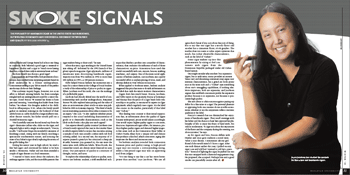Smoke Signals
 ALDOUS HUXLEY AND GEORGE BURNS HAD AT LEAST ONE THING IN COMMON: Both believed a good cigar is essential to happiness. Huxley said a cigar is “much more lasting than love, so much less costly in emotional wear and tear.”
ALDOUS HUXLEY AND GEORGE BURNS HAD AT LEAST ONE THING IN COMMON: Both believed a good cigar is essential to happiness. Huxley said a cigar is “much more lasting than love, so much less costly in emotional wear and tear.”
But how should one choose a good cigar?
Joyce Jacobsen and Peter Kilby, both professors of economics, have reached some surprising answers based on work undertaken by a former undergraduate. Connoisseurs willing to pay $20 in search of the perfect smoke may choke on their findings.
This academic inquiry began, however, not as an effort to debunk existing beliefs, but from nostalgia mingled with an undergraduate’s need for a senior thesis topic. David Freccia ’98 wanted his thesis to have personal meaning, “something that hadn’t been done before,” he relates. His thoughts wafted to his childhood in Albuquerque, N.M., where the family would gather on summer evenings in the backyard of their adobe house at a table shaded by a large mulberry tree. After dinner outside, his father would pull out a Dunhill Montecruz cigar.
“He’d carefully unscrew the red metal top from the cigar’s distinctive yellow tube, slide out the cigar, and elegantly light it with a single wooden match,” Freccia recalls. “I will never forget the wonderful sensation of finishing a meal, sitting with my family, watching a spectacular southwestern sunset, and noticing the scent of my father’s cigar slowly replacing the aroma of the grill’s fading fire.”
During his senior year in high school, he tried a few bad cigars and convinced his father to let him smoke a Montecruz. Father and son then attended a couple of cigar dinners at a local restaurant.
“I started to learn more about the industry, the embargo against Cuba, and the incredible passion that cigar makers bring to their craft,” he says.
About that time, cigar smoking in the United States was taking off. Informed by the 1992 launch of the glossy upscale magazine Cigar Aficionado, millions of Americans were discovering handmade cigars. Imports rose from 99.4 million in 1992 to more than 500 million in 1997—a 500 percent increase.
Kilby helped Freccia fashion his memories into a topic for a senior thesis in the College of Social Studies: a study of the relationship of price to quality in cigars. When Jacobsen read his work, she saw the makings of a publishable paper.
Jacobsen had already delved into the world of connoisseurship with another undergraduate, Benjamin Burton ’98, who explored wine pricing and the value of wine as an investment (their article on wine was published in 2001 in Economic Inquiry). “This kind of study raises interesting questions about what it means to be an expert,” she says. “It also explores whether prices respond to the actual underlying characteristics of goods or to observable characteristics—such as the label on the bottle—that play into snob appeal.”
Can experts identify quality in wine? Jacobsen cites a French study reported this year in the London Times in which experts failed to notice that one wine among a sample of reds was actually a white with red food coloring added. In a second test, the majority of 57 experts praised a grand cru but criticized a cheap vin de table; however (you guessed it), the two were the same wine with different labels. Wine frauds, the researcher noted, are almost never detected on taste alone. Our perception of quality is a mixture of thought, vision, and taste.
To explore the relationship of price to quality, economists use hedonic analysis, a well-established technique that divides a product into a number of characteristics, then evaluates the influence of each of those characteristic on price. Economists have used this model successfully with cars, tractors, houses, washing machines, and carpets. One of the more novel applications of hedonic analysis, says Jacobsen, was a partly successful effort to explain pricing of trout, steak, and shrimp dishes in New Orleans restaurants.
When applied to Bordeaux wines, hedonic analysis suggested that price has more to do with information on the label than with the wine’s intrinsic characteristics.
Cigars don’t fare much better. Freccia, Jacobsen, and Kilby report in the Quarterly Review of Economics and Finance that the price of a cigar bears little relationship to its quality, as measured by experts in Cigar Aficionado, which regularly rates cigars. It’s the label that counts in the market, particularly if that label says “Cuban.”
This finding runs counter to their initial supposition that, as information about the quality of cigars became widespread, prices would adjust accordingly. One would expect higher-quality cigars to cost more, they note. Experienced cigar rollers, for instance, produce higher-quality cigars and demand higher wages. A few areas such as the Connecticut River Valley or Cuba’s Vuelta Abajo have a unique soil and climate that produces a fine leaf, which costs more. Aging also improves the flavor and increases costs.
Yet hedonic analysis revealed little connection between price and quality rating. A high-priced cigar may not receive a corresponding rating, while a low-priced cigar may win an approving nod from judges.
“It’s one thing to say that a car has more horsepower than another,” says Jacobsen. “We can all agree that’s better if you care about that sort of thing. But to say that one cigar has a woody flavor and another has a cinnamon flavor, it’s de gustibus. The market does not seem to value expert opinions that much, but rather observable characteristics, such as the label of ‘Cuban’.”
Some cigar makers tap into this phenomenon by trying to fool consumers with cigars from the Dominican Republic packaged under old Cuban brand names.
One might wonder why smokers buy expensive cigars, but as with wine, vanity provides an answer. Tastes vary and discerning consumers may argue over intrinsic characteristics, but a grand cru looks pretty nice in the wine rack and a “Cuban” says something about one’s smuggling capabilities, if nothing else. More important, both are expensive, and Jacobsen argues that snobbish consumers prefer the expensive product because it is expensive, not because it possesses high quality.
She isn’t about to advise anyone against paying top dollar for a fine wine or a cigar. The personal pleasure or approving looks one receives do not trouble economists, whether or not the enjoyment reflects intrinsic qualities or the label.
Freccia’s research has not diminished his enjoyment of handmade cigars. They recall evenings with his father and the chance to hear him expound his philosophy of life: to enjoy the fruits of hard work, but only in moderation. “A cigar was about the enjoyment of the flavor and the company during the evening, not about nicotine,” he says.
As for cigars and love, Freccia differs with Huxley and once gave tradition a novel twist. “After a nice dinner, I sometimes ask my girlfriend if she would mind if I have a cigar. After one such dinner earlier this year, I pulled out my cigar case and told her I wanted to ask her a question.” Instead of lighting the cigar, he pulled out one that was wrapped with a diamond engagement ring. He proposed, she accepted. Perhaps love and a good smoke can peacefully coexist after all.

